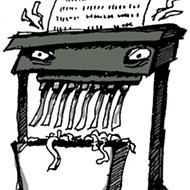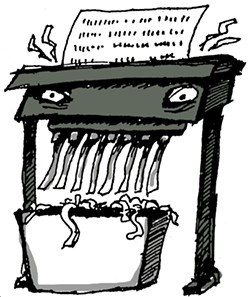[{
"name": "Newsletter Promo",
"id": "NewsletterPromo",
"class": "inlineCenter",
"insertPoint": "4",
"component": "15264767",
"requiredCountToDisplay": "0"
},{
"name": "Ad - Medium Rectangle CC01 - 300x250",
"id": "AdMediumRectangleCC01300x250",
"class": "inlineCenter",
"insertPoint": "8",
"component": "2963441",
"requiredCountToDisplay": "12"
},{
"name": "Ad - Medium Rectangle LC01 - 300x250",
"id": "AdMediumRectangleCC01300x250",
"class": "inlineCenter",
"insertPoint": "18",
"component": "2963441",
"requiredCountToDisplay": "22"
},{
"name": "Ad - Medium Rectangle LC09 - 300x250",
"id": "AdMediumRectangleLC09300x250",
"class": "inlineCenter",
"insertPoint": "28",
"component": "3252660",
"requiredCountToDisplay": "32"
}]
"You're in good hands." "It's at times like this that Metlife sets itself apart." "Like a good neighbor, State Farm is there." "Let Prudential be your rock." "All your protection under one roof." "Responsibility. What's your policy?" "Nationwide is on your side."
Hm. All these insurance company slogans seem very reassuring, don't they? The idea is we pool our resources and share our risks, and if tragedy befalls one of us, our shared investment will make the befallen whole. Even if your home is paid for, and even if like Scrooge McDuck you're sitting on enough cash to rebuild your home in case it's damaged or destroyed, homeowners' insurance is still a good idea. Who wants to decimate their savings to the tune of hundreds of thousands of dollars when they could have been setting aside a couple thousand bucks a year to bet they won't get burned to the ground?
The thing is, if you're still paying a mortgage (as are most California homeowners ... 67 percent), insurance isn't merely a good idea, it's a necessity. Mortgage companies require it. So, most of us dutifully pay up knowing full well we'll probably never recoup that money because to do so means tragedy has struck.
So, what do you do when your insurer, perhaps a company you've been with for decades, a company you've paid thousands of dollars to hedge your bet against disaster, suddenly tells you they're dropping you like a hot potato? And what if, after shopping around, you discover no other insurance company is willing to take your bet?
To top it off, we live in California, which means everything is more expensive—including building costs and homeowners' insurance. I mean, it's worth it, right? Ah, California, the Golden State, the white hot, yellow, orange, red-hot flaming Cheeto state with plumes of acrid black smoke bellowing into the sky. California.
I think the fire that changed it all, that really made insurance companies ask themselves if they can accept California's associated fire risks, was the 2018 Camp Fire that left the town of Paradise looking like the Seventh Circle of Hell, killed 85 people, destroyed nearly 19,000 structures, and torched 153,336 acres in Butte County.
Closer to home, we had the 2017-18 Thomas Fire and resulting mudslide in Ventura and Santa Barbara counties that killed 23, destroyed more than 1,000 structures, and burned a whopping 281,893 acres. Butte got hit again in 2020 by the North Complex Fire. Fire is a fact of life in California, and wildfires have become more frequent, more deadly, and more destructive. For California homeowners who can't get coverage, their option of last resort is the state's FAIR Plan Insurance, which only covers fire and no other kind of damage, and that costs up to $5,400 a year—about triple what most homeowners pay.
These issues compound and harm the housing market. If a prospective buyer needs an insurance policy to get a mortgage but can't get one, they can't buy a house and the seller can't sell. That in turn hurts businesses and the economy in general.
Nobody wants to pay more for insurance than they need to, but if insurance companies that had been providing coverage in California are now fleeing the state and leaving their customers high and fire-season dry, perhaps they weren't charging enough for premiums in the past. And that may be an entirely self-inflicted wound. In 1988, Californians passed Proposition 103 that required "prior approval" by California's Department of Insurance before insurance companies could implement property insurance rates. The ballot also required insurers to "roll back" their rates by 20 percent.
You get what you pay for ... and you don't get what you don't pay for. Now many California homeowners are holding a big bag of bail yourselves out, suckers.
And speaking of dropped hot potatoes, did the city of SLO leave renters holding a big bag of cockroaches, code violations, and overpriced rents? A group of Cal Poly students recently polled neighbors and discovered that they're living in squalor and no one's holding slumlords accountable. I know what you're thinking: "Hey, what about that 2015 Rental Housing Inspection Program (RHIP) that was supposed to assure health and safety standards for SLO rentals?"
Well, ha-ha-ha! Did you forget about the apoplectic fit people threw?
Then SLO City Councilman Dan Carpenter led the charge against the ordinance, calling it "by far the most egregious legislation we've passed during my tenure on council." Local gadfly and attorney Stew Jenkins joined with general contractor Dan Knight and buffoonish shit-stirrer Kevin P. Rice to gather signatures to strike the ordinance down.
Before it could get on a ballot, Heidi Harmon was elected mayor on the campaign promise of striking the RHIP down. For the record, in its nine months, the program worked. One-third of the 915 inspections found electrical problems, 31 percent discovered missing smoke detectors and 28 percent missing carbon monoxide detectors, 27 percent had improperly strapped water heaters, and 8 percent had plumbing problems.
Hey, but people didn't like the ordinance, so you got rid of it. OK, that's cool. But it was put in place to address a problem, so what did you replace it with to fix that ongoing problem? Oh? Was it nothing? A big, fat nothing? Great leadershit, team! Δ
The Shredder is happy living under the editor's desk. Complain at [email protected].
Do you think that off-roading should be allowed at the dunes?
Latest in Shredder
Readers also liked…
-

It ain't pretty
May 4, 2023 -

Carrot kingpins
Aug 17, 2023










